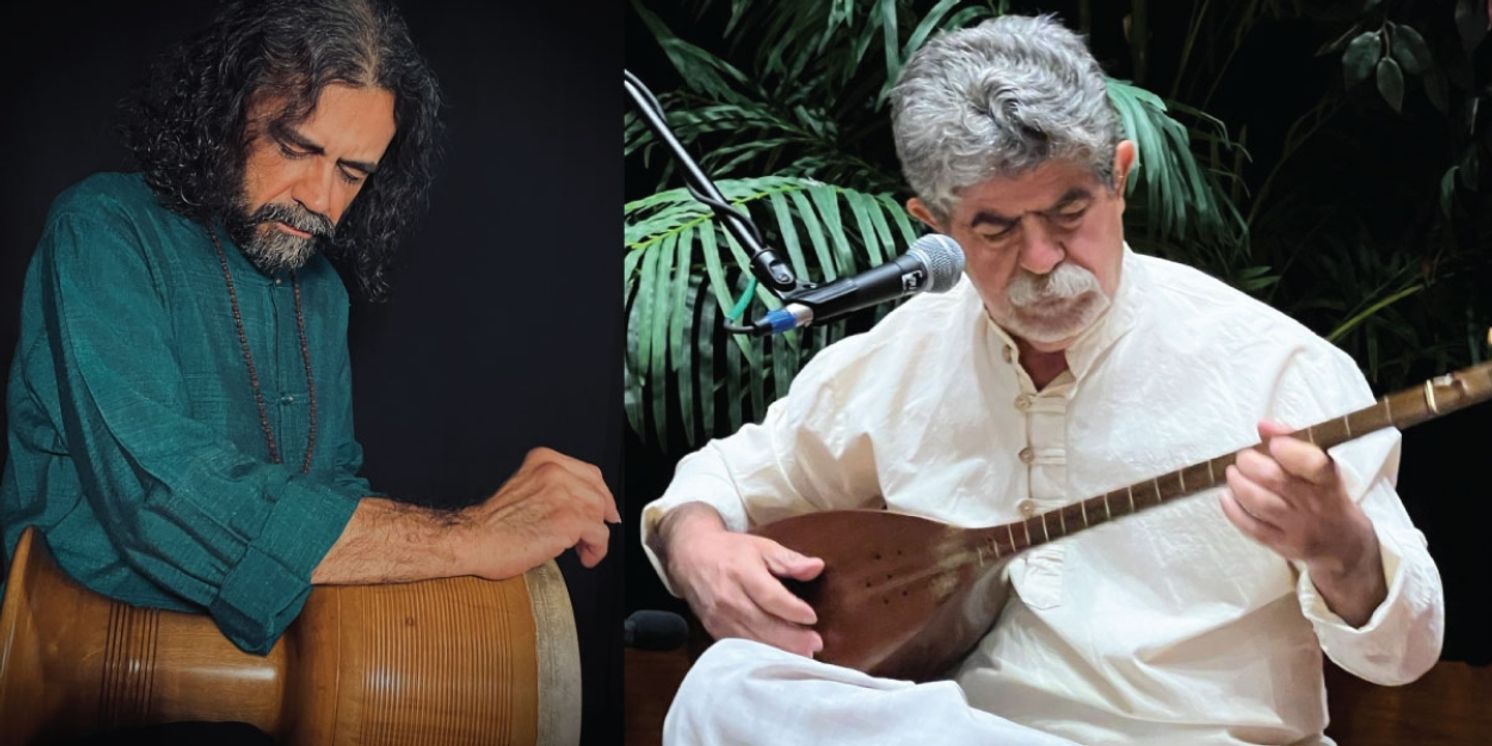Renowned Iranian Musicians Ali Akbar Moradi & Pejman Hadadi to Play Roulette This Month
The performance will be held on Saturday, November 23, 2024 at 8:00 PM.

Robert Browning Associates, Lotus Music & Dance, and Roulette will present a rare NY appearance of two of Iran's most renowned musicians performing improvisations for tanbur (lute) and percussion. ALI AKBAR MORADI & PEJMAN HADADI in SACRED MUSIC OF KURDISTAN will be held on Saturday, November 23, 2024 at 8:00 PM at Roulette, 509 Atlantic Avenue at 3rd Avenue, Downtown Brooklyn. Tickets: $40 in advance*; $45 at door; $35 students, seniors in advance* and at door.
Info/tickets: https://www.robertbrowningassociates.com/24-25-ali-akbar-moradi--pejman-hadadi.html
This program features a rare NY appearance of Ali Akbar Moradi and Pejman Hadadi, two of Iran's most renowned musicians. Moradi is an extraordinary virtuoso of the tanbur, an ancient 2-stringed long-necked fretted lute traditionally used in religious ceremonies. Hadadi is one of the most innovative Iranian percussionists (tombak, daf); he has been a member of the Dastan Ensemble for over 25 years and collaborated with countless master musicians in Persian and world traditions. Their program, Euphoric Whispers: Improvisations for Tanbur and Percussion, features ecstatic and trance-inducing Kurdish music from western Iran – music that is little known in the US. Their improvisations are based on the repertoire of the Yarsan people - followers of a mystical faith associated with Sufism - and the beauty and complexities of the art of this region.
The tanbur is the main instrument of Kurdistan and one of the earliest string instruments in the world. Difficult to master, it is played by sweeping across the soundboard with all of one's fingers, creating the illusion of several instruments being played at once. According to Moradi, “I discovered the tanbur in 1964, due to chance and by the grace of God, when I was only seven years old. I felt that this instrument had a soul and that it spoke to me: its song cradled me and purified me with every passing day. My grandfather and my father gave me great encouragement in this vocation because, for the Yarsan, the initiation in the tanbur is a pious task. From the beginning they sent me to the greatest masters. Now, I must devote my life to it. Without it, my life would be just a series of dull and futile days.”
Ali Akbar Moradi, born in Guran in 1957 near the city of Kermanshah, began playing the tanbur at the age of seven and studied with such grand masters as Sayyed Veli Husseyni, Sayyed Mirza Khafashyan, Sayyed Mahmoud Alevi, and Allahmouradi Hamedi. He gave his first recital at the age of 14 in Kermanshah, and one year later founded the first tanbur ensemble within the cultural department of the city. His fame increased in 1981 through his collaborations and tours with singer Shahram Nazeri in Europe, the US and Canada. By the age of 30, he had learned the entire 72 maqams (modes) of the Kurdish tanbur repertoire, making him perhaps the only living artist with this knowledge. He has made numerous recordings, including ones with Pejman Hadadi and Kayhan Kalhor, and appeared at such major festivals and venues as the World Festival of Sacred Music in Los Angeles, the Hellenic Festival in Athens, Greece, and the Royal Festival Hall in London. He currently teaches in Teheran and Kermanshah.
Pejman Hadadi, one of the most prolific percussionists from Iran, is known for his work with the Dastan Ensemble and Zarbang, as well as his performances with major artists from Iran and other cultures, including Hossein Alizadeh, Shahram Nazeri, Parissa, Kayhan Kalhor, Shujaat Khan, and Omar Faruk Tekbilek. He began studying tombak, the central drum in traditional Persian music, with master musicians Assadollah Hejazi and Bahman Rajabi. He later taught himself to play the daf, the sacred frame drum. He immigrated to the US in 1989 and began his professional career in 1991, performing and recording with ensembles of Persian classical music, as well as Indian, Turkish and American musicians. In 1995, he joined the celebrated Dastan Ensemble, and, in 2000, he co-founded the first Iranian percussion ensemble, Zarbang; with both groups he made acclaimed groundbreaking recordings. He has created a distinct signature style that has greatly impacted tombak players of his own generation and later ones. He is a two-time recipient of the Durfee Foundation Master Musician Award for dissemination and propagation of Persian music in the US. He has composed an extensive body of music for dance, performing in concert with renowned dancer and choreographer Banafsheh Sayyad and her ensemble, NAMAH. He has also collaborated with celebrated dancer and choreographer Shahrokh Moshkin-Ghalam. Hadadi has toured widely across North America, Europe, Iran and Japan, performing at prestigious international festivals and concert halls. Currently, he lectures in the Ethnomusicology department at UCLA.
Made possible in part with public funding provided by the National Endowment for the Arts.
Videos

